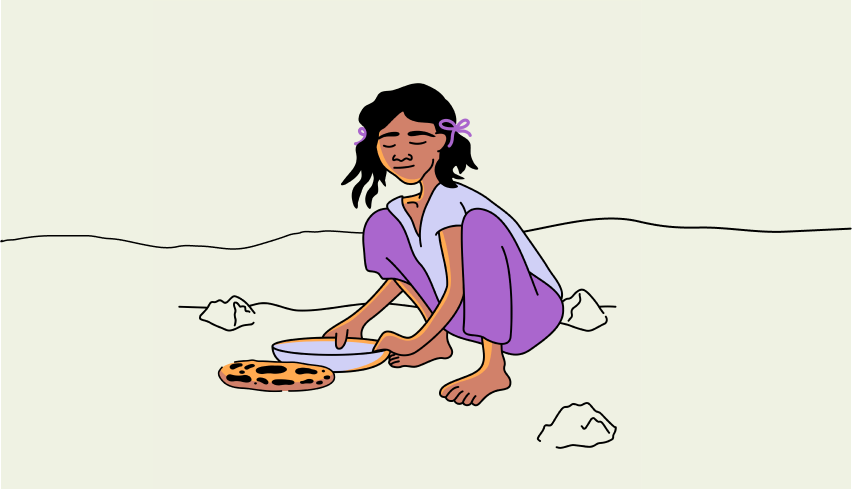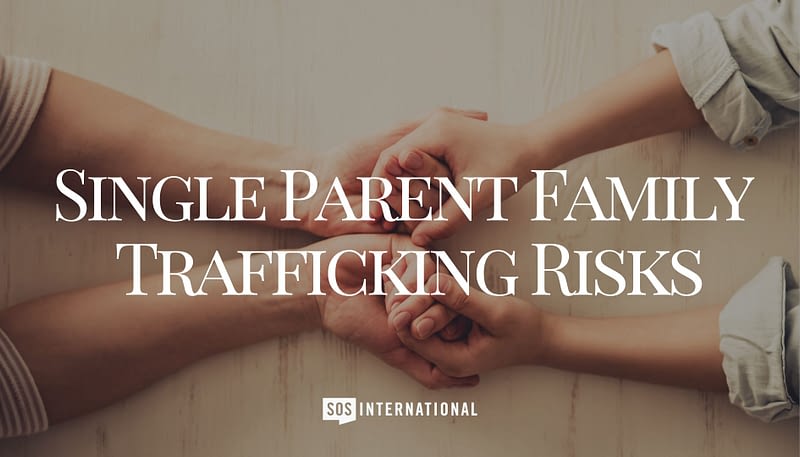Written By: SOS International
There are aspects of human trafficking that are consistent around the world. One thing you can always count on traffickers to do is to look for the most vulnerable people to exploit. A common group sought after and exploited are single-parent families. Single-parent families can face unique challenges that make affording basic needs difficult, giving traffickers an opportunity to traffick parents or their children.
Economic Disadvantage
The lack of economic stability is one of the most significant vulnerabilities traffickers exploit. Those who struggle to meet their basic needs, such as food and water, are particularly at risk. Single-parent families face critical vulnerabilities stemming from the economic disadvantages they encounter.
Single-parent families — especially mother-only households — are significantly more likely to live in poverty compared to married-parent households. A study conducted by Gallup, which gathered data from 148 countries, revealed that 44% of single women aged 18 to 60 with children under 15 reported having difficulty affording food for their families in the past year, compared with 28% of other adults. In the US, 40% of Single mothers said there have been times in the past 12 months when they did not have enough money for food. ¹
Single mothers often struggle to afford necessities because they face additional expenses that dual-parent households may not. In the US, single mothers working full time in 2022 had a medium income of $40,000.24; this is lower than single fathers’ income ($57,000), married mothers’ income ($60,000), and married fathers’ income ($76,000). ² This data shows that single mothers are far more likely to be at a disadvantage to afford basic needs.
For single moms, finding childcare is a huge part of raising their kids. While some parents are fortunate to have family members available to help out, it’s more common for single parents to rely on paid childcare. In the US, childcare can cost anywhere from 8% to 19.3% of a median family income per child.³ When a child inevitably gets sick and can’t attend daycare or school, a single parent must take time off work to stay home. For single parents, that usually means using sick leave or losing pay for the day. This is not beneficial for the well-being of single parents or their children.
Many single parents juggle multiple jobs, often working night shifts, which makes finding a babysitter more challenging. In contrast, two-parent households can better manage costs and share responsibilities, especially when one parent needs to stay home with a sick child or help out when the other has to work unusual hours. Unfortunately, single parents often have to handle everything on their own.
The high cost of childcare may lead some parents to consider leaving their child home alone or in the care of a younger sibling. For many of these parents, it can feel like this is their only option to provide for their children’s needs.
This situation can lead to a pattern of childhood isolation, making it difficult for children to connect with a trusted and safe network of adults. Traffickers often exploit vulnerable children or their parents by promising food or other basic necessities to lure them into slavery, preying on a child’s isolation.
Childhood isolation and social network
Living in a single-parent home with financial stress can be overwhelming. This stress can greatly affect children, leading to feelings of sadness, anxiety, loneliness, and abandonment, as well as difficulties in socializing. Traffickers often target individuals who exhibit emotional vulnerabilities and lack a solid social network. Children from single-parent households are at a higher risk of experiencing both of these factors. Their emotional vulnerability and isolation make them easier targets for traffickers, who may manipulate their feelings by offering a sense of safety or value. Without a supportive social network, these children are more isolated and vulnerable, making it simpler for traffickers to exploit their emotions.
Katherine’s Story
Katherine is a single mother raising nine children in one of the most dangerous neighborhoods in Latin America. Traffickers and drug lords frequent this area because the extreme poverty makes the children easy prey. Katherine fell victim to this vicious cycle, and at the age of 13, she was trafficked and became a very young single mother.
20 years and 8 children later, Katherine is still fighting for survival. But now, it is not only her life on the line. Every day, Katherine has to make impossible decisions about her safety in order to provide food for her children. 5 of Katherine’s children are girls – a fact traffickers have eagerly preyed on for years. She is not just fighting to provide food for her children; she is literally fighting to keep them safe from traffickers.
Food for Katherine’s family has the power to help break the cycle of abuse and poverty they are trapped in. Securing their most basic needs will allow them enough safety to start building towards a better future.
Sadly, Katherine’s story is not unique, and almost every food request we receive is directly tied to a child’s safety. We are on a mission to raise $250,000 by the end of the year to effectively respond to this crisis. You can join us in impacting the lives of children who are at-risk of human trafficking.












